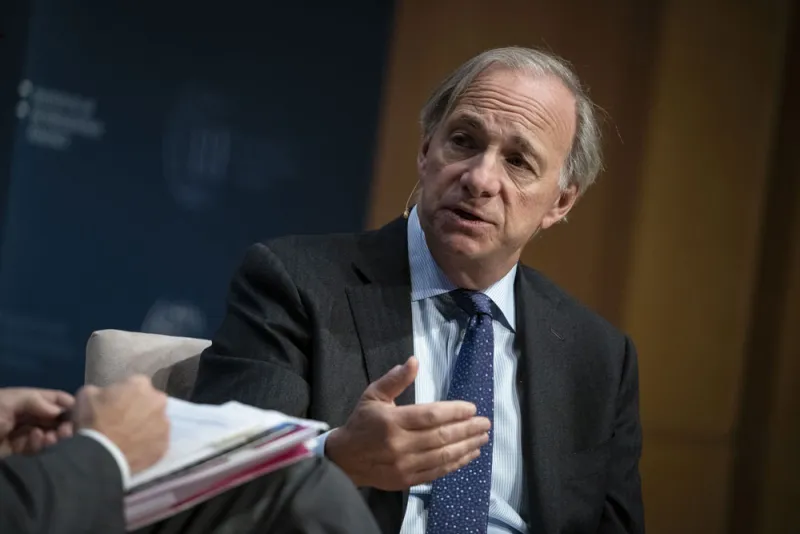Bridgewater Associates founder Ray Dalio and Tudor Investment Corp. founder Paul Tudor Jones have a combined net worth of nearly $24 billion. Both men also think capitalism is broken.
In a wide-ranging conversation at the Greenwich Economic Forum Tuesday, the hedge fund billionaires sounded the alarm on wealth inequality and pointed to a breakdown of the capitalistic system in delivering for the average American.
Both men have expressed these concerns before — Dalio through various LinkedIn posts and Jones through his JUST Capital initiative, which he has said aims to “use markets to fix markets.” But the urgency of their concerns appears greater.
“It has to be treated as a national emergency, that we have this wealth gap and we’re going to kill each other,” said Dalio, referring to increasing populism both on the left and the right. “The system doesn’t work. It’s gone mad, and the reason the system is broken is because it’s not an equal opportunity system… We have not made capitalism work for the average person.”
Dalio — who said he plans to publish a LinkedIn post along the same lines — sees three phenomena contributing to political and societal instability.
The first is the large wealth gap, which has led to a large political gap and increased polarity. “We are at each other’s throats and it’s not functional,” he said, likening current conditions to the 1930s.
The second factor, he said, is the absence of effective monetary policy, with political leaders likely unable to agree on any stimulus packages that may be necessary. “This is when times are good — imagine what it’s going to be like when we have a downturn” and lack effective monetary policy.
The third phenomenon is the shift in global power, with the ascension of China. “When there is a rise of a power to challenge the existing power, then there is going to be conflict,” Dalio predicted.
[II Deep Dive: Why Paul Tudor Jones Fears a ‘Revolution’]
For his part, Jones cited interest rate policy as an area of particular concern.
“The low interest rate policy… is creating an excess and the excess is in our public deficits,” he said. “At our current pace, in less than ten years we will exceed threshold where Greece had issues. It’s the most conducive environment for serving the short run for economic growth and strength that I’ve ever seen. Add on to that an 11 percent budget deficit in China — the second-biggest economy — and 3 percent in Japan: it’s a heady economic brew that we’re all consuming.”
The two men had a dim view of politicians’ abilities to fix the problems.
“Donald Trump is the greatest salesman in the history of this country,” said Jones. “He has somehow been able to move the Republican party into believing that a 5 percent budget deficit adjusted for economic strength right now is a reasonable proposition and one that is good government policy. He has — and I’m being charitable here — through great moral suasion convinced the Federal Reserve that running negative real rates with a 50-year low in unemployment is reasonable monetary policy with no consequences.”
Both blasted populism on both the right and the left, expressing skepticism that modern monetary theory as espoused by some Democratic politicians will be able to pick up the slack if other policies fail. They also pondered the impact of a Democratic president in 2020 and whether the rollback of corporate tax cuts passed in the Trump administration would occur — a scenario Dalio said would affect asset pricing.
Dalio highlighted the problem of unfunded pension and health care liabilities, pointing out that these are typically paid for with either spending cuts (which he said can be “inhumane”) or tax increases, neither of which he views as feasible.
After exhaustively laying out the problems with wealth inequality, rising political polarity, and the inability of capitalism to solve those problems in its current state, Dalio and Jones explored how to fix it. Here, the two billionaires differed.
Jones touted his initiative JUST Capital, which aims to address the problems of corporate capitalism by identifying “just,” or good, companies, in the hopes that capital will flow to these firms and corporations will be motivated to focus beyond pure profits.
“Today, 13 percent of revenue goes to shareholders,” Jones said, noting that the figure used to be 6.5 percent. “Why did it go from 6.5 to 13 percent? Another question would be CEO pay,” he went on. “How many employees do we have not making a living wage relative to what I am paying the CEO? It’s a legitimate social moral ethical question to ask. And hopefully we’re going to start asking that in every damn board meeting.”
According to Dalio, the President — “or somebody” — needs to declare the situation a national emergency and bring together a bipartisan group of economic experts and individuals who are dealing with the problems of inequality day to day. “I’d lock them up in a place for six month and say you can’t come out unless you reach an agreement that is smart that increases the size of the pie and divides the pie well,” Dalio said.
But he expressed skepticism that this will ever happen.
“I don’t think we are going to do that,” Dalio said. “I think we’re going to try to kill each other.”






